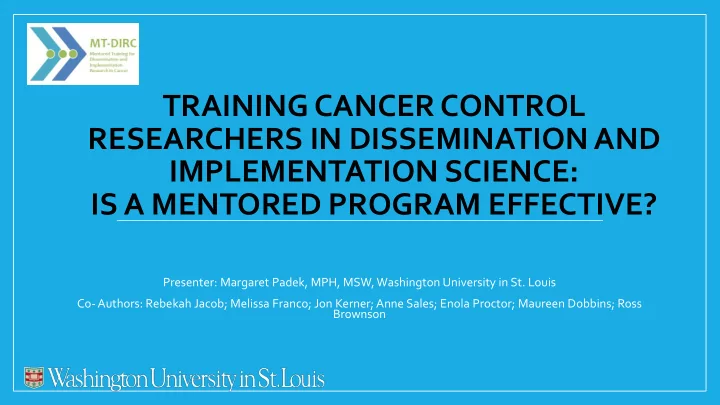

TRAINING CANCER CONTROL RESEARCHERS IN DISSEMINATION AND IMPLEMENTATION SCIENCE: IS A MENTORED PROGRAM EFFECTIVE? Presenter: Margaret Padek, MPH, MSW, Washington University in St. Louis Co- Authors: Rebekah Jacob; Melissa Franco; Jon Kerner; Anne Sales; Enola Proctor; Maureen Dobbins; Ross Brownson
Need to Build the Future of D&I • Still a relatively new field • Field is seeing dedicated funding sources • Need for skilled researchers • Still limited number of formal training programs • Many job openings for junior-level D&I researchers • http://news.consortiumforis.org/
Mentored Training in Dissemination and Implementation Research in Cancer (MT-DIRC) Focus on Early-Mid career Cancer Control Researchers Funded by National Cancer Institute Additional Collaboration with Veterans Administration & Cancer Research Network Week long training institute at Washington University in St. Louis Attend twice over 2 summers. Ongoing mentoring Quarterly content webinars
MT-DIRC Core Faculty Graham Colditz Ross Brownson Enola Proctor Christine Pfund David Chambers Anne Sales Maureen Dobbins Debar Haire-Joshu Shiriki Kumanyika Jon Kerner
Expert Faculty
Snapshot of Fellows (n=56) 79% Female 38% work in Prevention research 55% were Assistant Professors when started in program Harvard, University of Michigan, Boston University, University of Kansas, University of California, San Diego, Veterans Administrations, Kaiser Permanente, etc.
Fellows’ Demographic Breakdown (n=56) Area of Cancer Control Gender Survivorship, Male, 21% 20% Prevention, 48% Treatment, 20% Female, 79% Diagnosis, Detection, 5% 7%
Fellows’ Demographic Breakdown (n=56) Research position at start of program Nationality Other, 2% Professor, 6% Australia, 5% Other, Canada, 4% 5% Postdoctoral Researcher, 14% Research Scientist, 7% Associate Professor, 16% Assistant USA, 86% Professor, 55%
D&I Competencies No identified list of D&I competencies prior Utilized card sort & concept map to identify 43 identified competencies Four Domains: Definitions, Background and Rationale Theory and Approaches Design & Analysis Practice-Based Considerations The following references contains more details on this process: Padek M, Colditz G, Dobbins M et al. Developing educational competencies for dissemination and implementation research training programs: an exploratory analysis using card sorts. Implementation Science. 2015;10(1). doi:10.1186/s13012-015-0304-3. Tabak R, Padek M, Kerner J et al. Dissemination and Implementation Science Training Needs: Insights From Practitioners and Researchers. American Journal of Preventive Medicine. 2017;52(3):S322-S329. doi:10.1016/j.amepre.2016.10.005.
Evaluations D&I Skill acquisition- Pre & Post Institute Mentoring Competency Assessment https://mentoringresources.ictr.wisc.edu/EvalTemplates Institute Program Evaluation Social Network Analysis
D&I Skill acquisition Measurement taken: 1-month Pre-Test 6 months Post-Institute 18 months Post-Institute “ How skilled do you currently feel in the following D&I Competencies …?” 5 Point Likert Scale: 1- “Not at all Skilled” to 5 - “Extremely Skilled” Summer Institute #2 Summer Institute #1 Pre-Test Post Test #1 Post Test #2 June, Year 2 Year 1, December Year 1, June Year 2, Year 1, April December Timeline of Program & Skills Evaluations
Competencies with Largest Effect Sizes Pre-Test Post- 6 mo. Post-18 mo. d = 1.99 d = 2.15 d = 2.02 4.23 4.04 3.92 3.69 3.46 3.15 2.85 2.35 2.27 DEFINE RESEARCH ADDRESS VALIDITY IN STUDY DESIGN IDENTIFY MEASURES & STRATEGIES
Competencies with Smallest Effect Size Pre-Test Post- 6 mo. Post-18 mo. d =1.05 d = 1.06 d =0.88 4.15 3.85 3.69 3.73 3.65 3.46 3.23 2.77 2.73 IDENTIFY SITES TO PARTICIPATE DESCRIBE MIXED-METHODS APPROACHES DEVELOP SUSTAINABLE PARTNERSHIPS
Changes in Fellows’ D&I skills over time grouped by skill competency level (n=26) Repeated- Mean and Standard Deviation Mean difference and Cohen’s D measures ANOVA Skill Pre- 6 6- 18 Pre- 18 Competency Pre 6 month 18 month F value month month month Level Beginner 2.98 3.84 4.23 -0.87*** -0.39*** -1.26*** F=73.56*** ±0.63 ±0.63 ±0.57 d =1.38 d =0.65 d =2.10 Intermediate 2.55 3.41 3.76 -0.87*** -0.35** -1.21*** F=63.45*** ±0.67 ±0.58 ±0.56 d =1.38 d =0.61 d =1.95 Advanced 2.04 3.04 3.25 -0.99*** -0.21 -1.21*** F= 34.17*** ±0.66 ±0.60 ±0.85 d =1.58 d =0.29 d =1.59 Note: Greenhouse Geiser corrected F statistic shown where Sphericity violated. *Indicates significance reached at p <.05 **Indicates significance reached at p <.01***Indicates significance reached at p <.001
Changes in Fellows’ ( n=26) D&I skills over time grouped by summary capacity domain. Repeated- Mean and Standard Deviation Mean difference and Cohen’s D measures ANOVA Competency Pre- 6 Pre- 18 Pre 6 month 18 month 6- 18 month F value Domains month month A: Definitions, 2.80 3.69 4.03 -0.89*** -0.34** -1.22*** Background & 54.27*** ±0.67 ±0.56 ±0.51 d = 1.43 d =0.63 d = 1.97 Rationale B: Theory & 2.57 3.42 3.78 -0.86*** -0.35*** -1.21*** 66.97*** Approach ±0.76 ±0.70 ±0.61 d =1.16 d =0.55 d =1.76 C: Design & 2.38 3.28 3.65 -0.90*** -0.37** -1.27*** 57.0*** Analysis ±0.69 ±0.63 ±0.64 d =1.37 d =0.59 d =1.37 D: Practice 2.75 3.61 3.91 -0.86*** -0.31* -1.17*** Based 44.06*** ±0.76 ±0.61 ±0.70 d =1.25 d=0.47 d =1.60 Considerations Note: Greenhouse Geiser corrected F statistic shown where Sphericity violated. *Indicates significance reached at p <.05 **Indicates significance reached at p <.01***Indicates significance reached at p <.001
What does this mean? Significant improvement in D&I skills over 2 years Measure is subjective, no known objective measure…. yet! We don’t want our Fellows to be this guy
Going forward Data being collected on remaining two cohorts Final collection of Fellows products Connect skills data with mentoring & social networks data Paper under consideration at Implementation Science Working with partners on off-shoot programs
Questions? • Contact: Maggie Padek mpadek@wustl.edu or Rebekah Jacob rebekahjacob@wustl.edu • Check us out on • @mtdirc • www.facebook.com/mtdirc • www.mtdirc.org • Funding Support from • National Cancer Institute Grant # R25CA171994 • Veterans Administration • Additional Collaboration with The Cancer Research Network
Recommend
More recommend